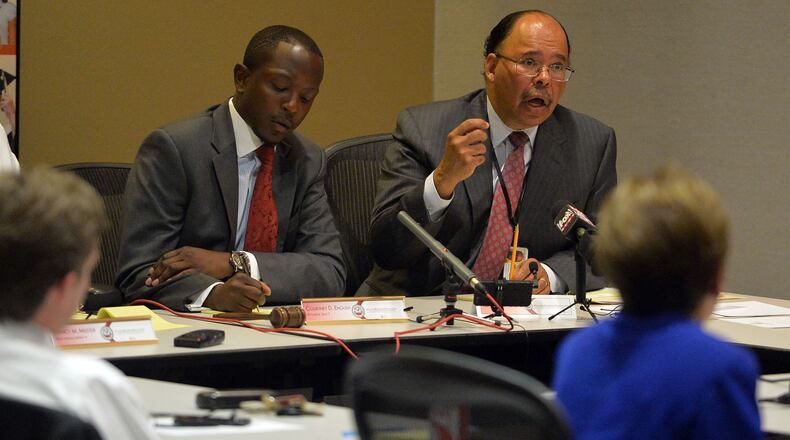Digging Deep. The Atlanta Journal-Constitution was the first to report that Atlanta Public Schools and the City of Atlanta had reached an impasse over potentially more than $160 million in tax revenue stemming from Beltline development, and that the fight could land in court. The AJC will continue covering developments on the dispute.
Myajc.com
What’s on the horizon for the Atlanta Beltline? Visit www.MyAJC.com/beltline for the latest news on the popular Atlanta attraction, a work in progress.
With talks between Atlanta Mayor Kasim Reed and Atlanta Public Schools leaders over the Beltline debt at a standstill, city council and school board members searched Tuesday for common ground on the increasingly divisive issue.
But their nearly two-hour meeting suggests APS and the city remain far apart on how to settle the Beltline’s multimillion-dollar obligation. Some members of the board and council disagreed on central issues such as how much the school district is owed and whether the city should dip into non-Beltline funds to repay the debt.
At issue is a $162 million contract to help fund the Beltline, a green space project converting dilapidated rail lines into a 22-mile loop of parks, trails and transit.
Although the school board and council pledged Tuesday to work together to find a quick resolution to the Beltline problem, neither is directly involved in negotiations. Final approval of any agreement is subject to school board and city council approval, but the negotiations are being conducted by Mayor Kasim Reed — who was not present Tuesday — and former APS superintendent Erroll Davis, who was appointed to negotiate on the school district's behalf even after his retirement last week.
Talks have stalled in recent weeks as Reed has criticized Davis for threatening legal action to resolve the debt. Davis said Tuesday no date for continuing the negotiations has been scheduled.
“Obviously nobody has the power to make the mayor do anything,” APS board member Cynthia Briscoe Brown, who represents the school district on the Beltline board, said. “But I hope that if the mayor sees that there is a spirit of collaboration and a spirit of forward progress among the rest of the stakeholders that he will be willing to join in that spirit and get this resolved.”
Reed’s office and APS leaders have met for nearly two years over a contract that all agree is now — in a post recession world — unsustainable.
They disagree on what to do about it. City leaders say the Beltline can’t afford to make $162 million in payments agreed upon before the recession hit, and want to overhaul the deal.
APS — facing its own financial constraints — says the city’s failure to live up to its end of the Beltline bargain harms the school district. It’s asking the city to pay $19 million it believes is already past due, but Atlanta officials disagree with that figure. Officials acknowledge the Beltline did miss a $6.75 million payment due in January.
Davis has said “all options” are on the table to settle the debt, including a lawsuit.
In recent weeks, Council President Ceasar Mitchell has positioned himself as a peacemaker between the warring entities. Mitchell and APS Board Chairman Courtney English, who have become allies on this issue, set up the joint meeting of the council and school board.
Until now, the council has not had a formal role in the negotiations. Reed’s administration, Invest Atlanta and Atlanta Beltline Inc. officials have represented the city in those talks. Atlanta Beltline Inc. is the nonprofit overseeing the project’s build-out.
Mitchell said Tuesday that the focus of Tuesday’s meeting was to better understand the problem and current negotiations, not to do Reed and Davis’ jobs. However, Mitchell said the group could tell Reed its suggestions and strategies for a resolution.
“This is about bringing (people) together and closing ranks on an issue that appears to be tearing us apart,” he said.
Among divisions revealed at the meeting, however: whether $26 million in tax revenue the city agreed to let APS keep in a 2009 amendment should count toward the Beltline’s debt and whether the city should offer other assets or tap its general fund to pay APS.
Councilmembers Felicia Moore and Yolanda Adrean expressed reluctance to offer city assets. Moore believes the Beltline tax allocation district, or TAD, alone should fund the payments and introduced a resolution at Monday’s city council meeting echoing her views. The Beltline TAD uses a portion of city, county and school property tax revenue to fund the project.
Adrean said APS and city leaders should exhaust all options within the Beltline TAD before considering other solutions.
“You all need to get paid, it’s pretty simple,” Adrean said to the APS board and Davis.
But until those negotiations with the Beltline are complete, she said, “I think all of this general fund stuff is off the table from this councilmember’s point of view.”
About the Author
Keep Reading
The Latest
Featured

